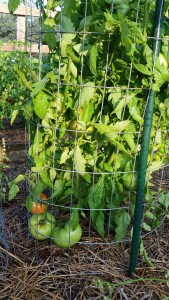
(Chelsea Update would like to thank Jennifer Fairfield, owner of the Garden Mill, for the information in this column.)
El Nino could bring us a nicer winter than the last two, at least according to the national forecasters. However, the Farmer’s Almanac says we are in for another cold and snowy winter. Who to believe?
Whoever is right, September is usually when many of us start to think about preparing our yards and gardens for winter, even if the current temperatures are more like summer (I’m not complaining – it means continued great stuff from the garden).
In the vegetable garden:
We have had quite a dry spell around here since late June, so be sure to keep your garden watered whenever we aren’t getting at least an inch of rain.
If your tomato plants are still putting out new flowers, it’s time to pinch them off. Flowers that are forming now are not going to have time to mature before we get our first frosts, and leaving them on means that your plants are spending unnecessary energy on growing those, when they really should be using all their energy to mature and ripen the fruit that is already there.
I have even taken off all of the really small fruits on my plants, since they aren’t likely to get very big, and my plants have lots of large fruit already that I am (not so patiently) waiting to ripen.
Pull any plants that have finished producing and compost them. Consider replacing them with late plantings of baby leaf lettuces, radishes, or spinach. You can even put in kale at this late date, as kale is pretty hardy and can handle some frost.
Keep in mind that spinach doesn’t germinate as well when the temperature is high, so be sure to cover the ground with some mulch and water frequently to help keep the soil temp down.
Do not compost tomato plants or really any plants showing signs of disease, as composting is not guaranteed to kill many garden diseases.
Keep harvesting your pole beans, summer squash and cucumbers so that they will keep producing while we still have warm days.
Continue to spray your tomatoes, peppers, squash, and cucumbers with fungicide. As the weather cools down and we get rain and even heavy morning dew, conditions are really good for disease. Regular spraying of fungicide will help slow down the progression of disease and extend your harvest.
I am very happy that I have been vigilant in my spraying this year because it has helped me get a really great tomato crop, which I didn’t have the last two years, because I didn’t do as good a job of keeping up with the fungicide those years.
If you have basil in your garden, and you are seeing some black spots on the leaves, don’t despair – the low temperatures we had for a few nights last week are most likely to blame. Basil doesn’t like temps below 50 degrees, and it got down to 47 at my house at least one night.
Simply cut or pluck off those leaves – the rest of the plant should be fine. As the season winds down though, keep some row covers or insulation handy to cover up your basil when the nighttime temperatures are expected to get below 50. The N-Sulate product we have at the store can keep your plants as much as 6 to 8 degrees warmer than the air temperature. I like them because they are lightweight enough that I don’t have to worry about crushing my plants, as heavier things such as sheets would do.
The way any cover works is to capture the ground heat and keep it close to your plants. So whatever you use, to really get the best effect, cover the plants before it cools down too much. It also helps to secure the covers to the ground so that the wind doesn’t blow them off.
I also use the N-Sulate covers in my garden to help prolong my harvest of many things as frost starts to threaten towards the end of the month.
(Part two of Let’s Get Gardening in September will publish tomorrow.)














